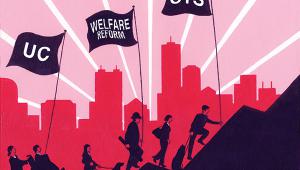The most ambitious welfare reform for decades was bound to take a while to get right. But did the introduction of universal credit really need to take this long?
By the time it is rolled out in job centres across the country over the next 18 months, UC will already have been more than five years in the making.
And this is just the start, or at least the end of the beginning. After computer glitches, rows over rent arrears and cuts in work incentives, the latest estimate is that some claimants will not switch to UC until 2022 – five years later than planned.
The most recent delay was announced in July by Damian Green, the new work and pensions secretary, and the third person to hold the post this year. The brains behind universal credit, Iain Duncan Smith, quit the post in March.
Yet, in spite of all the hiccups, UC appears to retain all-party support.
Universal credit sees six existing benefits rolled into one (see panel opposite). Claimants receive a single monthly payment based on how much (if anything) they earn, how many children they have and how much they spend on housing.
According to David Finch of the Resolution Foundation, the original timetable for UC, based on it being introduced by 2017, was overly ambitious. “You are trying to create something that’s dealing with a hugely complex set of circumstances,” he says.
Three years ago, the National Audit Office said universal credit was suffering from weak management while, earlier this year, the House of Commons Public Accounts Committee accused the Department for Work & Pensions of being “evasive” over delays.
Some of the strongest criticism comes from social landlords, which fear that tenants on UC will fail to pass on the money they receive for rent. This could lead to hefty arrears and possible evictions. At present, housing benefit (which is being phased out), is usually paid directly to social landlords.
In a curious case of government doublespeak, the DWP describes the system of relying on tenants to pass their rent on to landlords as “direct payment”. A pilot scheme two years ago found that arrears initially rose when tenants became responsible for paying their rent but, once tenants got to grips with the new system, arrears were no higher than normal.
At least one local authority, however, challenges these findings. Southwark found that rent arrears rose by 16% over the 18 months it piloted direct payment and says some tenants are still paying off debt. The London council says this means annual arrears could rise by as much as £14m once most or all of the tenants who qualify for benefits are on UC.
Duncan Whitfield, director of finance at Southwark, says the DWP “averaged out” findings from six pilots to conclude that arrears should not rise. In the long run, he warns, costs will fall on the Department for Communities & Local Government as evicted tenants become homeless. “You have social care costs generated from a welfare benefit process,” he says.
A survey in May found that 79% of council tenants nationally who received UC were in arrears, compared with 31% of council tenants overall. Many tenants who start claiming UC wait for up to seven weeks for their first payment, says Chloe Fletcher, policy director at the National Federation of Arm’s Length Management Organisations, which carried out the survey with the Association of Retained Council Housing.
This leads to them using payday lenders, who snap up that first UC payment once it comes through. “You are setting people up with money problems that they might not get out of for years to come,” she says.
Tameside, part of Greater Manchester, was one of the first areas to pilot UC in 2013. As in other areas, it is mostly single people without children who currently receive UC. At New Charter, the largest local housing association, 87% of the 650 tenants who receive UC are in arrears. Most owe just under £400, equivalent to nearly one month’s rent, although nearly all the money due is eventually collected.
Over the past 18 months, 20 households at New Charter in receipt of UC have been evicted, including some who had built up arrears before claiming the benefit. The association contacts tenants to discuss how they might budget. “We’re trying to distinguish between historic arrears and those accrued through universal credit,” says director of revenue Julie Vickers.
The DWP argues that most UC claimants are comfortable budgeting to pay rent. Where tenants are identified as being likely to run up arrears, landlords can ask to be paid directly by the government using the traditional system.
However, in an apparent admission that matters are not going well, welfare reform minister Lord Freud said in July that the department was looking into the cause of arrears.
About 20 housing associations have been granted “trusted partner status”, which allows them to switch tenants to the old system without DWP permission. Gareth Bevan, policy officer at the National Housing Federation, says the department is belatedly working more closely with landlords but too much inaccurate data is still being processed by associations and the DWP.
Last year, after the government backtracked on cuts to tax credits, it cut the amount people can earn before losing UC. An estimated 2.5 million families that are entitled to tax credits will, on average, be about £40 per week worse off when they switch to UC before 2020-21.
Alison Garnham, chief executive of the Child Poverty Action Group, says: “Universal credit was supposed to make work pay but the cuts will make it harder for low earners to get better off by earning more.”
In July, the Public Accounts Committee embarked on its fourth inquiry into UC in three years, this time looking at potential fraud. Its report is due in September. In 2013, the committee accused the DWP of failing to understand the scale of the task of introducing UC and “a failure to intervene promptly when problems arose”.
Meg Hillier, chair of the PAC, told PF that many of UC’s early problems were down to an unwillingness among civil servants to tell ministers that matters were going awry. While the DWP appears to have turned the corner, MPs are still unsure if they are being told the full story. “These things take a long time to embed,” Hillier says.
“It [the DWP] should be transparent about what it’s trying to achieve and how.”
Universal credit
Universal credit replaces income-based job seeker’s allowance, employment support allowance, income support, child tax credit, working tax credit and housing benefit.
It is being rolled out over eight years, starting with new claims. The first UC claimants were mainly single people.
The launch three years ago was beset by computer problems and the DWP was forced to write off millions of pounds in IT costs. The department now claims to be on track, with its full digital service (covering all new claimants) due to be available everywhere by 2018.
The numbers receiving UC have risen significantly over the past year, reaching 279,315 in June 2016. An estimated 7.7 million households will eventually be eligible.
The government says UC encourages people to work as they will receive it while earning. Its projections show 3.1 million households should eventually be better off, and 2.8 million households worse off.




















